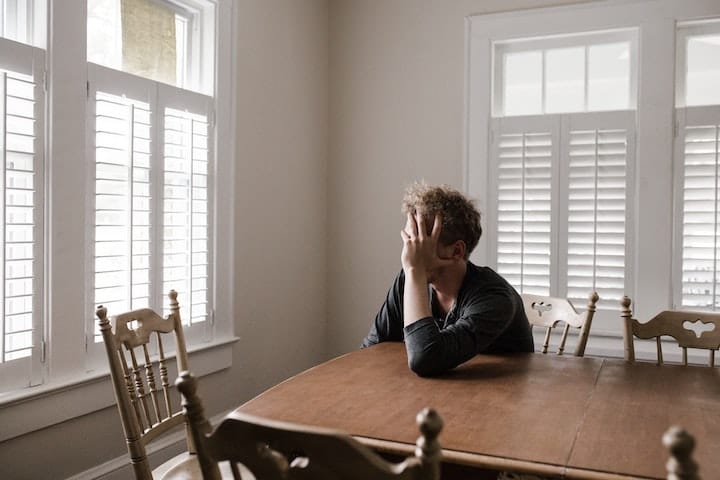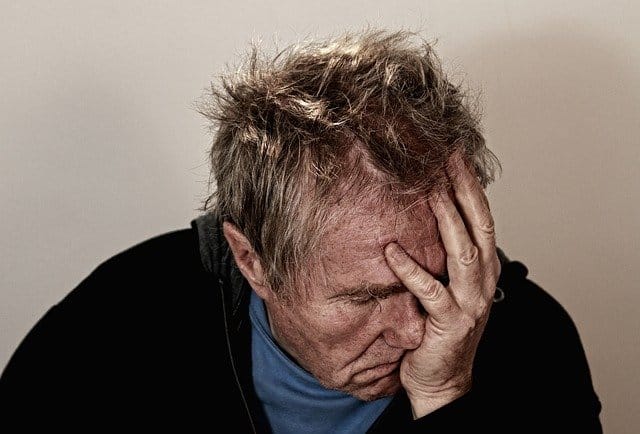In 2022, there were a reported 6,588 deaths in the UK that were recorded as suicides, with men being three times more likely to commit suicide than women. [1]
Though this number has gradually been decreasing since 1981, it is still an issue amongst individuals of a certain age range, in specific situations, and those who may be struggling with serious mental health issues.
There are many reasons why an individual may turn to suicide, and this includes all genders, backgrounds, and cultures, but this blog specifically aims to explore the reasons why men in the UK are more likely to commit suicide than women, as well as how this can be helped.
Every individual considering suicide can be helped, and steps can be taken to overcome these feelings, but it is vital that these individuals seek help as soon as they are able or as soon as possible.
For help regarding suicide and addiciton, call our support line on 0800 140 4690

In 2020, there were a recorded 5,224 suicides – 75.1% of which were male – showing how much more likely men are to commit suicide. [2]
In general, it is thought that women are more likely to consider suicide, but men are more likely to die as a result of these thoughts.
In the modern world, this is often explained by the fact that men are less likely to seek help for mental health issues, often considering them not to be ‘manly’ and that by admitting to mental health issues, they are therefore considered ‘less of a man’.
This, of course, is not the case – every individual deserves equal access to care, as well as equal opportunities when speaking about their mental health and seeking treatment as a result of this should never be considered as a sign of weakness or something to be ashamed of.

Studies suggest that there are more men struggling with depression than those who are in care and that this may also be experienced differently than depression in women.
For example, a man may be more likely to experience depression through aggressive, violent, and abusive means [3] – almost opposite to feelings of loneliness, helplessness and low mood that are typically experienced with most forms of depression.
Because of these different experiences, men may therefore feel differently about entering care, perhaps thinking that they are not displaying ‘typical symptoms’.
However, it is important to remember that every individual will have a different experience of depression, whether this includes symptoms, moods, emotions, and physical effects – no matter their gender.
Some women may also experience depression in these ways, but it is far less documented, and most women may also not feel comfortable in admitting these feelings, further adding to the issues when it comes to seeking suitable and appropriate treatment.
For help regarding suicide and addiciton, call our support line on 0800 140 4690

Suicide is often seen as a ‘last resort’ for many individuals. This may be due to constant feelings of low mood, a way to ‘cope’ with the struggles of mental health, or as a result of past failed treatments.
However, these issues can generally all be treated with some form of support system, treatment program, or course of therapy, and should always be considered by individuals who may feel this way.
One study suggested [4] that men in older age groups were more likely to commit suicide due to rigidity in their sense of self and making positive life changes, the pressure of withholding a ‘dominant male’ role, and cultural influences.
Struggling with these issues over a long period of time, as well as the accompanying low moods, negative emotions, and general depressive cognitions, can therefore lead someone to believe that suicide is their only option.
However, as this blog post has previously discussed, there is always a next step that these individuals can take, including getting suitable and practical care for their symptoms and situation.

There are many risk factors for men – especially middle-aged men – that can lead to them feeling as though suicide is their only option.
However, the most common of these can generally be categorised into the following broad headings: [5]
This list cites some of the most common risk factors but is not extensive.
For example, someone struggling with a long-term health issue who has received treatment over a long period of time but feels as though they are seeing little to no progress may feel as though suicide is a viable option for them, but this is not the case.
As well as receiving their physical health treatment, an individual may also receive mental health support, including therapy and talking treatments that are aimed specifically toward the individual and their unique situation and feelings.
When applied suitably, these support systems and treatment programs can greatly reduce the risk of someone committing suicide, as well as improve other areas of their life such as their mental health in general and the strains on their social and familial relations.
For help regarding suicide and addiciton, call our support line on 0800 140 4690

As mentioned in this blog, everyone will experience risks of suicide and depression differently, meaning that there is no ‘set way’ of determining whether or not someone is at risk of suicide.
However, there are a few factors that may allude to this.
For example, individuals considering suicide may become more reclusive, they may stop engaging in behaviours that they previously enjoyed, or they may begin to spend an uncharacteristic amount of time around their loved ones where they may have previously avoided them.
The following subheadings outline some of the steps that individuals at risk of committing suicide can take to reduce these feelings, as well as how they can help themselves to work toward a healthier and happier future.

If an individual is seriously considering suicide, then they should try to delay these behaviours for as long as they can, perhaps telling themselves that they can take it day by day.
Though this can seem incredibly difficult, living through one more day, one day at a time, is a great way to gain a new respect for daily life, appreciate the small things, and gain a new perspective on life.
From a loved ones’ perspective, this can be encouraged by providing daily activities for the individual in question, encouraging them to take part in activities that they enjoy with the people who care about them.
By taking on the challenges of life in this way, individuals may begin to develop the perspective of ‘I can do one more day’ very quickly, and telling themselves ‘Why not one more day?’ because, at the end of the day, this is a good way to think about life in general, and can make the issues that they are facing seem that much smaller each day.
For help regarding suicide and addiciton, call our support line on 0800 140 4690

If there is something that the individual recognises as something that makes them consider suicide more strongly, then it is important that this is identified and avoided as best possible.
Known as a trigger, this can be anything from something as small as listening to the morning news, all the way up to something such as talking to and engaging with a specific person.
In all cases, it is important that the individual recognises these triggers and makes their best attempt to remove these factors from their life as quickly or as effectively as they can.
If this includes cutting someone or something out of their life, then this may be a little harder but could be essential for the individual’s long-term health and well-being.
It may also be beneficial to keep track of these triggers in a specific diary or notebook (either physically or digitally) as this can be used in the future to help a therapist or counsellor to explore these issues deeper, helping the individual in the long-term as well as giving specific direction to their therapy sessions and/or support.

In many cases, mental health issues such as depression, anxiety, bipolar disorder and schizophrenia – all of which can lead to an individual considering suicide if left untreated long enough – can also lead to struggles with addiction (also known as a substance use disorder).
This is when an individual becomes dependent on a drug (e.g., cannabis, heroin, alcohol, cocaine) in an attempt to alleviate other mental health issues that they may be struggling with.
Often, these substances have short-term benefits for the individual, including boosting the mood of the person is consuming them, but almost of all these substances can have serious long-term complications if consumed in high quantities over a long period of time.
In most cases, individuals who become addicted to a substance are offered rehabilitation, starting with a detox (when necessary), before progressing to later treatments and therapies, and finally aftercare – any further care received after the bulk of their treatment that has the goal of supporting their long-term recovery.
For help regarding suicide and addiciton, call our support line on 0800 140 4690

If an individual is considering suicide, then it is suggested that they find a safe place as soon as they are able.
This could mean removing themselves from triggering stimuli, removing things around them which could cause them harm, or leaving a specific environment.
Once the individual has entered a safe place, they should then contact loved ones or close friends who are aware of their situation or those who they trust to help them during difficult times.
This safe place should be free of triggering stimuli, should not contain anything that an individual could use to cause harm to themselves or others, and should be somewhere that the individual generally feels safe i.e., away from people, objects, situations, and other factors that may make them feel more negatively.
A safe place should be considered if an individual feels as though they may be experiencing more suicide risk factors. This is so that when they feel as though they are especially at risk, they already have a plan in place and are not stuck or confused as to how they can help themselves.
Bear in mind that an individual’s safe place could be anywhere or with anyone including at home, in the presence of someone whom they feel comfortable around, or at a location away from home.

In any case of mental health struggles, an individual should consider other people that they are comfortable sharing with, turning to in crisis, or those who they know can help them to feel better about themselves and their situation.
This could be a close friend, a family member, or someone completely different – this is completely up to the individual in question, not whoever others think that they should turn to in crisis such as a therapist or counsellor.
In most cases, simply talking to someone else and sharing experiences, thoughts, and feelings can greatly reduce the stress and negative emotions that an individual may be experiencing.
Studies have shown [6] that engaging with others in socialisation and social activities can reduce levels of loneliness, symptoms of depression, and increase the individual’s level of social functioning.
For help regarding suicide and addiciton, call our support line on 0800 140 4690

In addition to speaking to others, it can also be beneficial for individuals considering suicide just to be around others.
This can be in any setting or situation, including just hanging out with close friends (no socialisation necessary), taking part in an activity with others, or just being in a public place.
This makes it far less likely that an individual will commit suicide due to others being around them, as well as the possibility that those around them may offer helpful advice, suggestions on their next step, and any additional support that they are able to.
Public places are also a great place to ‘people-watch’ – something which may also boost the individual’s respect for life around them, as well as the possibility of gaining a new perspective on their situation, purely based on the experiences of those around them.

Another difficult option is to find a distraction when experiencing suicidal thoughts.
This can include a number of different options such as finding a new hobby, engaging in social activities, and generally moving the mind away from these thoughts and onto a new thought track.
A common example is to keep a diary of when the individual feels specific negative thoughts.
This means that whenever the individual experiences any of these feelings, they will first write about this in their diary, creating an immediate distraction.
It may also be beneficial later in the stages of the individual’s care, as this diary could be used to determine the best course of treatment and providing a focus of care when they first begin treatment.
For help regarding suicide and addiciton, call our support line on 0800 140 4690

In terms of the modern world, there are many steps that we, as a nation and more broadly, can take to reduce the number of male suicides, and generally promote positive mental health toward specific groups of individuals.
The following subheadings outline some of these steps, as well as their practicalities in the modern world.

Many men who struggle with mental health issues see their state of mind as a weakness, and something that should not be shared with others for fear of being made fun of, embarrassed, or generally thought of as lesser.
This is not the case.
In the modern world, the population is becoming more and more aware of the mental health issues that everyone is faced with, no matter their gender, social background, or upbringing.
This is why it is vital that everyone is encouraged to speak about their mental health, seek help where needed, and not be ashamed of their situation – especially men, and especially men who are heavily impacted by the concept of toxic masculinity.
For help regarding suicide and addiciton, call our support line on 0800 140 4690

As well as in someone’s day-to-day life, it is important that individuals are supported throughout all aspects of their life.
This includes the individual’s workplace – something which can be a key risk factor for the development of stress and subsequent mental health issues.
Having support at work, through the individual’s employer, can be a great way for individuals to realise that help is all around them and that mental health is something that is acceptable to speak about – no matter who you are or what you do.
This can be achieved by hiring mental health support in the workplace, either through HR or as its own specific area of employment. This should also be advertised to individuals in the workplace, with an emphasis on confidentiality and specialist support systems.

To learn more about men’s mental health, suicide risks, addiction, and mental health in general for all individuals, get in touch with Rehab 4 Addiction’s dedicated and specialised team of support.
Operating on a highly confidential basis, we provide support for all individuals, no matter how serious their issue may seem to them, and this is all done professional and in a friendly manner, making it easy to speak to a member of our team today.
To get in touch, call our support line on 0800 140 4690 today